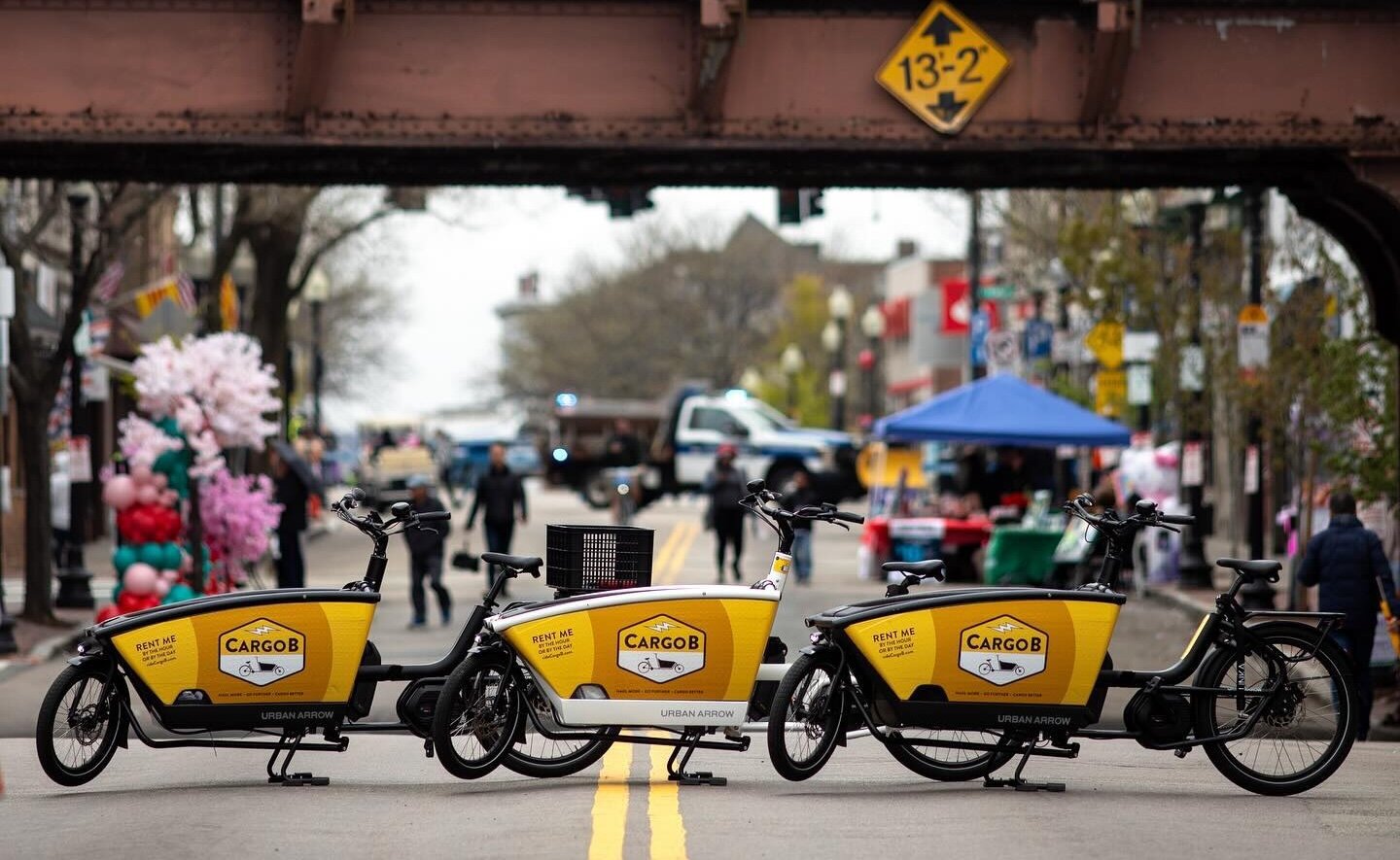This story was originally published by The 19th.
Cierra walked into the Bowens Senior Center with trepidation, but also hope.
The promotional flier that brought the mother of three to this community center a few miles outside of Detroit offered to help people eliminate any active warrants for their arrest — people like her, who had a warrant for a years-old traffic violation.
But something else on the flier also caught her attention: Along with promising no arrests, it highlighted that child care would be provided. So Cierra brought her four-year-old daughter and dropped her off with a volunteer at a multi-colored bounce house just a few feet from the makeshift courtroom inside. A handful of local attorneys and judges who volunteered their Saturday to help process cases waited behind the doors.
“The child care is why I showed up,” said Cierra, who asked that her last name not be published because her case dealt with sensitive legal matters. “Being able to bring my child without fear of being arrested is everything.”
Cierra was among dozens of people who came out in early June for the so-called warrant clinic, one in a series of nationwide events that aims to address active warrants, usually those tied to outstanding traffic violations and misdemeanors. The periodic one-day events can be life-changing. People with lifted warrants can get back a driver’s license. They can apply for jobs. They can seek services that help with housing and food insecurity. They can also vote.
Weighed down by negative news?
Our smart, bright, weekly newsletter is the uplift you’ve been looking for.“We are adding capacity to the justice system,” said Anza Becnel, the creator of the warrant clinics and the founder and executive director of Growing Real Alternatives Everywhere (GRAE), a nonprofit that helps organize the clinics. “We are adding capacity to things that we’ve identified that the community needs.”
Becnel, who is also the warrant clinic manager for Black Voters Matter, said part of his goal is to give people more power in the legal system. Becnel noted that finding secure child care amid a national scarcity can disproportionately impact mothers.
“Parents miss court dates normally because they’re caring for children,” he said. “To bring a child into a contested zone? Into an arrestable zone? Court is too much to take.”
It’s part of why Angel Washington brought her 3-year-old daughter to the clinic. For years, she had wanted to address a warrant linked to a more than a decade-old marijuana possession arrest during a traffic stop. The amount she had is now legal under Michigan’s recreational marijuana law.
While Washington went inside the center, a volunteer helped her little girl use chalk to write her name on the pavement. Knowing her daughter was cared for gave Washington a peace of mind that felt impossible to imagine at a traditional courthouse. She feared simply going to court to inquire about her record.
“You don’t want your kid to go into the system because you’re trying to get more information,” she said.
Washington, a mother of two, said child care was pivotal, “especially when you don’t have a strong support system like family that can just drop everything to watch your child while you take care of things.”
Becnel said that’s why it’s so critical to partner with judges and attorneys to bring court to people — particularly parents.
“We have everything that’s in court — the clerks, the computers, everything is there,” he said. “Except what? You don’t have a bailiff that’s telling a mom they can’t check their phone to see if their child is OK. You don’t have a bailiff that’s telling the mom they can’t breastfeed. It gets deep. So that’s the premise that you build on: creating court for ourselves.”
The first iteration of the warrant clinics began in 2017 in New Orleans. Eventually Becnel, under GRAE, began hosting the clinics, then Black Voters Matter became involved in 2021. Just a handful of clinics have been held yearly, but that’s starting to change. At least eight are tentatively scheduled for this year, including in Flint, Michigan; Macon, Georgia; and Raleigh, North Carolina. The clinic locations are based on community interest, and most are expected to offer child care.
An arrest warrant can lead many people to forgo interactions with the government — including voting. While lawmakers in some Republican-led states have enacted new penalties around alleged voter fraud — a rare occurrence — headlines about people with felony convictions who have been arrested for voting illegally can scare people. A traffic violation that leads to a suspended driver’s license can also make it harder to vote in states with voter ID laws.
“You see these stories like people in Florida getting arrested because they voted when they shouldn’t have been able to vote, or you hear about Crystal Mason in Texas,” said Cliff Albright, co-founder and executive director of Black Voters Matter. “So you hear these stories, and then you start wondering, ‘Well, I don’t even want to be in that situation. I don’t even want to have to deal with that.'”
Albright added that these realities play out in Democrat-controlled states like Michigan as well because election denialism groups are challenging voting eligibility in local counties everywhere.
“Being in a blue state does not mean that you’re not exposed to some of the dangers and concerns of when you don’t have your ID and when you have these outstanding warrants,” he said.
The event in Pontiac was the first hosted in Michigan, and organizers hope to have another one in the city this year. Organizers estimate 80 people showed up on Saturday and more than 100 warrants were lifted. They believe more people could be persuaded to come out with community trust building.
Judge Ronda Fowlkes Gross, one of the judges who reviewed cases on Saturday, was worried by the level of apprehension from people across from her. Even as people sat down they repeatedly asked her, “Is this for real?”
Gross tried to offer a reassuring smile as people approached her table. She walked them through their records, sometimes seeking more information about the history of their case. Some fines could be excused because the cases were so old. One woman had a 10-cent debt.
“Please be patient with the process,” Gross told one person. “Take a deep breath, it’s going to be OK,” she told another.
Gross told The 19th afterward: “I talked with the organizers. I said, ‘You know, we need to do another clinic so that the public knows when we have these pop-up clinics — don’t be afraid to come in and participate and clear up your matters.’”
Twana Hamilton, an organizer for GRAE who signed people in all day, heard about some of that fear.
“People think it’s a setup,” Hamilton said. “But once they see a family or friend promote it, they’re coming on down.”
Hamilton encouraged people to post on social media about the event in real time.
While some clinics will be geared toward people with low-level felony offenses, many of the people who showed up at the Pontiac clinic had simple traffic violations. For Cierra, it was linked to a 2017 traffic stop when she was cited for not having proof of car insurance. Not realizing the repercussions, she didn’t prioritize making it to the local courthouse to pay the associated fine.
But the costs and ramifications then spiraled. So had Cierra’s fear about it. What if she was stopped by a police officer and her warrant popped up on her record? What if she appeared in court after all these years and they arrested her? Who would take care of her daughter?
Cierra said the clinic allowed her to breathe. After she dropped off her daughter at the bounce house, she filled out paperwork and was quickly connected with an attorney inside. The attorney sat down with her to face one of the judges.
Cierra was back outside less than a half hour later, clutching a piece of paper that lifted her arrest warrant. It gave her instructions for how to pay her outstanding debt, which she could make in installments. She felt relieved.
“I don’t have this over my head,” she said. “I feel like I conquered something.”
Not everyone’s case was resolved. That was true for Washington, whose traffic stop happened just outside city lines. Still, Washington said she left with a positive experience and gratitude that she could be connected with legal help without the threat of arrest.
“Even though they weren’t able to help me, I’d like to volunteer to be a part of their movement, because I love what they’re doing for the community,” she said.
Kermit Williams, co-director of Oakland Forward, one of the local nonprofits that hosted the Pontiac warrant clinic, said he was “overwhelmed” by the event and its potential. He spent part of Saturday, checking in on volunteers and attendees to make sure they were hydrated and fed.
“We ready to do this next week,” Williams told Becnel with a smile, a hug and a handshake when he saw his co-organizer. “We ready to do this once a month.”
Williams said these events are important for people with different life circumstances, recalling a woman who came out to the clinic and said her child was being bullied at school. The woman had been hesitant to contact the school to complain, out of fear that her active warrant could somehow be used against her.
“Imagine something like that stopping a parent from speaking up,” Williams said.











